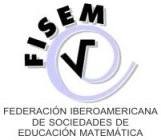O que motiva as mulheres a estudar Matemática: um estudo de caso
Resumo
Este texto apresenta uma investigação que teve por objetivo identificar os fatores que têm motivado estudantes universitárias a escolher uma licenciatura em Matemática. Os dados foram obtidos por meio de 15 entrevistas semiestruturadas feitas a estudantes da licenciatura em Matemática da Universidad Autónoma de Guerrero (México), com análise qualitativa das mesmas. Alguns fatores identificados foram: gosto pela Matemática e o fato de serem boas alunas nessa matéria. Sustentados no conceito teórico de identidade argumentamos que os fatores identificados são elementos constituintes de uma identidade positiva de estudantes de Matemática. Concluimos que esses fatores permitem a construção de uma identidade a de boas estudantes de Matemática, favorecendo a seleção da área da Matemática para os estudos universitarios.
Downloads
Referências
Aguilar, M. S., Vázquez, A. R., Mendoza, A. R., Zavaleta, J. G. M. y Alonso, A. C. (2013). Factors motivating the choice of mathematics as a career among mexican female students. En B. Ubuz, C. Haser y Mariotti, M.A. (Eds.), Proceedings of the Eighteenth Congress of the European Society for Research in Mathematics Education (1409-1418). Turquía: European Society for Research in Mathematics Education.
Anderson, R. (2007). Being a mathematics learner: four faces of identity. The Mathematics Educator, 17(1), 7–14.
ANUIES (2014). Anuario educación superior-licenciaturas. Anuarios estadísticos de educación superior. [base de datos]. D.F., México: ANUIES.
Barrera, P. S. (2012). Mujeres matemáticas en México. Ciencia, 63 (3), 44–53.
Buerk, D. (1983). An experience with some able women who avoid mathematics. For the Learning of Mathematics, 3(2), 19–24.
Black, L. y Williams, J. (2013). Contradiction and conflict between ‘leading identities’ : becoming an engineer versus becoming a ‘good muslim’ woman. Educational Studies in Mathematics, 84(1), 1–14.
Cerinsek, G., Hribar, T., Glodez, N. y Dolinsek, S. (2013). Which are my future career priorities and what influenced my choice of studying science, technology, engineering or mathematics? Some insights on educational choice-Case of Slovenia. International Journal of Science Education, 35(17), 2999–3025.
De Guzmán, M., Hodgson, B., Robert, A. y Villani, V. (1998). Difficulties in the passage from secondary to tertiary education. Proceedings of the International Congress of Mathematicians, 3, 747–762.
Del Giudice, M. (2014). Why it’ s crucial to get more women into science. National Geographic [en línea]. Recuperado el 8 de diciembre de 2016, de http://news.nationalgeographic.com/news/2014/11/141107-gender-studies-womenscientific-research-feminist/
European Commission (2009). Statistics and Indicators on Gender Equality in Science. She figures 2009. Bruselas: European Commission.
Forgasz, H., Leder, G. y Tan, H. (2014). Public views on the gendering of mathematics and related careers: international comparisons. Educational Studies in Mathematics, 87(3), 369–388.
Gee, J. P. (2001). Identity as an analytic lens for research in education. Review of Research in Education, 25(1), 99–125.
Hill, T. P. y Rogers, E. (2012). Gender gaps in science: the creativity factor. The Mathematical Intelligencer, 34(2), 19–26.
Holmegaard, H. T., Ulriksen, L. M. y Madsen, L. M. (2014). The process of choosing what to study: a longitudinal study of upper secondary students’ identity work whenchoosing higher education. Scandinavian Journal of Educational Research, 58(1), 21–40.
Kleanthous, I. y Williams, J. (2013). Perceived parental influence and students’ dispositions to study mathematically-demanding courses in higher education. Research in Mathematics Education, 15(1), 50–69.
Mendick, H. (2005). Mathematical stories: why do more boys than girls choose to study mathematics at AS-level in England? British Journal of Sociology of Education , 26(2), 235–251.
Onion, A. J. (2011). Women’ s stories of learning mathematics. Research in Mathematics Education, 13(3), 307–308.
Organisation for Economic Co-operation and Development (2008) EncouragingStudent Interest in Science and Technology Studies. Paris: OECD.
Pedersen, I. F. (2013). “I need advanced mathematics to pursue the career of my choice”. Norwegian students’ motivations for enrolling in mathematics and plans for postsecondary studies. Nordic Studies in Mathematics Education, 18(1), 61–83.
Piatek-Jimenez, K. (2008). Images of mathematicians: a new perspective on the shortage of women in mathematical careers. ZDM – Mathematics Education, 40(4),633–646.
Riessman, C. (2008). Narrative Methods for the Human Sciences. E.U.A.: Sage.
Sfard, A. y Prusak, A. (2005). Telling identities: In search of an analytic tool for investigating learning as a culturally shaped activity. Educational Researcher, 34(4), 14–22.
Stine, D. D. y Matthews, C. M. (2009). The U.S. Science and Technology Workforce. Washington, DC: Congressional Research Service.
Direitos de Autor (c) 2017 Rosa Iris Monico Manzano, Mario Sánchez Aguilar

This work is licensed under a Creative Commons Attribution 4.0 International License.
O material publicado na revista é distribuído sob a licença Creative Commons International Attribution 4.0 (CC-BY 4.0). Esta licença permite que outros distribuam, misturem, ajustem e desenvolvam seu trabalho, mesmo para fins comerciais, desde que você seja creditado com a criação original. Os autores das obras publicadas na Revista Unión mantêm seus direitos autorais sem restrições.
##plugins.generic.dates.published## 2017-04-16







.png)






